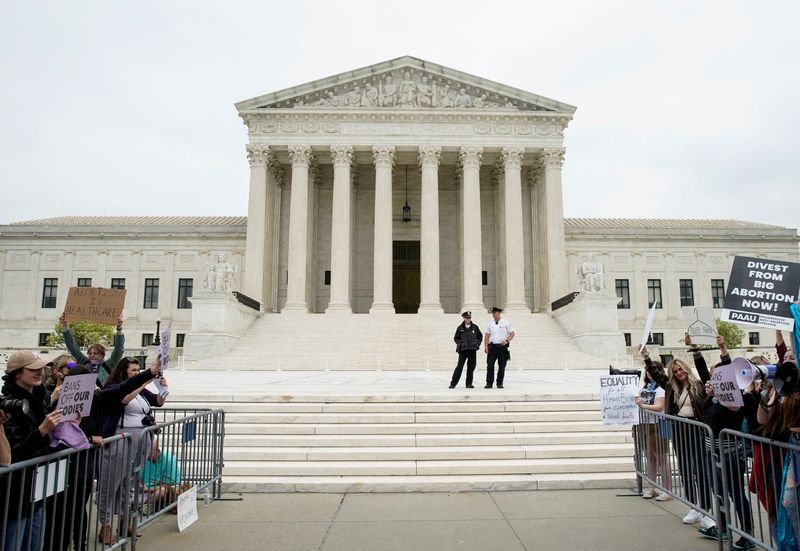By Mike Scarcella, Karen Sloan and Jacqueline Thomsen
(Reuters) - The leak of a draft U.S. Supreme Court opinion striking down the landmark 1973 Roe v. Wade decision that legalized abortion has spurned intense national debate over the identity of the leaker and whether the person could face criminal or other sanctions.
Here is a look at some of the big questions.
COULD LEAKING A SUPREME COURT RULING BE PROSECUTED AS A CRIME?
That depends on the origin of the leak and whether any crimes were committed in obtaining the document, such as hacking into a unauthorized computer.
Drafts of Supreme Court opinions are not classified documents like national security files, said University of California, Berkeley criminal law professor Orin Kerr, meaning their disclosure would not automatically trigger a criminal investigation. But even a leaker with authority to handle a draft opinion could potentially be charged with stealing or converting federal government property for their own use, he said.
Anyone who lies to an investigator as part of the court's leak probe could also face a federal false statement charge, said Kel McClanahan, an adjunct professor at George Washington University Law School who specializes in national security law.
WHO WILL INVESTIGATE THE LEAK?
Chief Justice John Roberts said Tuesday that he has directed the court's marshal to investigate the leak, calling it an "egregious breach." Roberts said the draft decision was authentic but not final.
The marshal is the court's chief security officer and facilities administrator, overseeing the court's police force. Gail Curley, former chief of the National Security Law Division in the U.S. Army's Judge Advocate General office, took up the post last year. She did not immediately respond to a request for comment on the leak probe.
The Supreme Court marshal is not part of the U.S. Marshals Service or the Justice Department, but the police she supervises can make arrests and her findings could be referred to federal prosecutors.
COULD THERE BE AN ETHICS PROBE IF THE LEAKER IS AN ATTORNEY?
Yes. Washington's bar and others have rules that forbid lawyers to "engage in conduct involving dishonesty, fraud, deceit, or misrepresentation." The Washington bar also has a rule that says lawyers cannot "engage in conduct that seriously interferes with the administration of justice." Attorney disciplinary officials can investigate matters on their own or respond to complaints.
Leaking a draft opinion would be a violation of court confidentiality rules and could result in disbarment, Kerr said. "This is the most egregious violation of confidentiality for a staff member or employee of the court that you can imagine," he said.
Experts cautioned that the leak would need to involve a licensed member of a state bar for attorney conduct provisions to apply. Not every federal law clerk is a member of a bar, and it is unclear whether a law clerk had any involvement.
Michael Frisch, a former disciplinary counsel in Washington, said if the leaker is identified as an attorney, it would fall to the bar where that lawyer is a member to investigate. "It's going to be a career-defining, if not career-ending moment," Frisch said.
WHAT HAPPENED AFTER PAST SUPREME COURT LEAKS?
The leak of a draft Supreme Court ruling appears to be unprecedented. However, leakers have shared information about internal court dynamics or deliberations after opinions were issued. That happened with the high-profile Bush v. Gore case that decided the outcome of the 2000 presidential election, and also in 1998 when Edward Lazarus, a former clerk for Justice Harry Blackmun, wrote a tell-all book about his time there. Experts could not recall any high court leak resulting in prosecution or disciplinary action.

A series of leaks in the 1970s prompted the federal courts to adopt a law clerk code of conduct, said Todd Peppers, a professor of practice at Washington and Lee University School of Law who studies Supreme Court clerks. The code prohibits clerks from disclosing "confidential information received in the course of official duties."
Chief Justice Roberts delivers a lecture each year to new clerks saying leaks will be punished severely, said Supreme Court expert Josh Blackman of South Texas College of Law Houston.